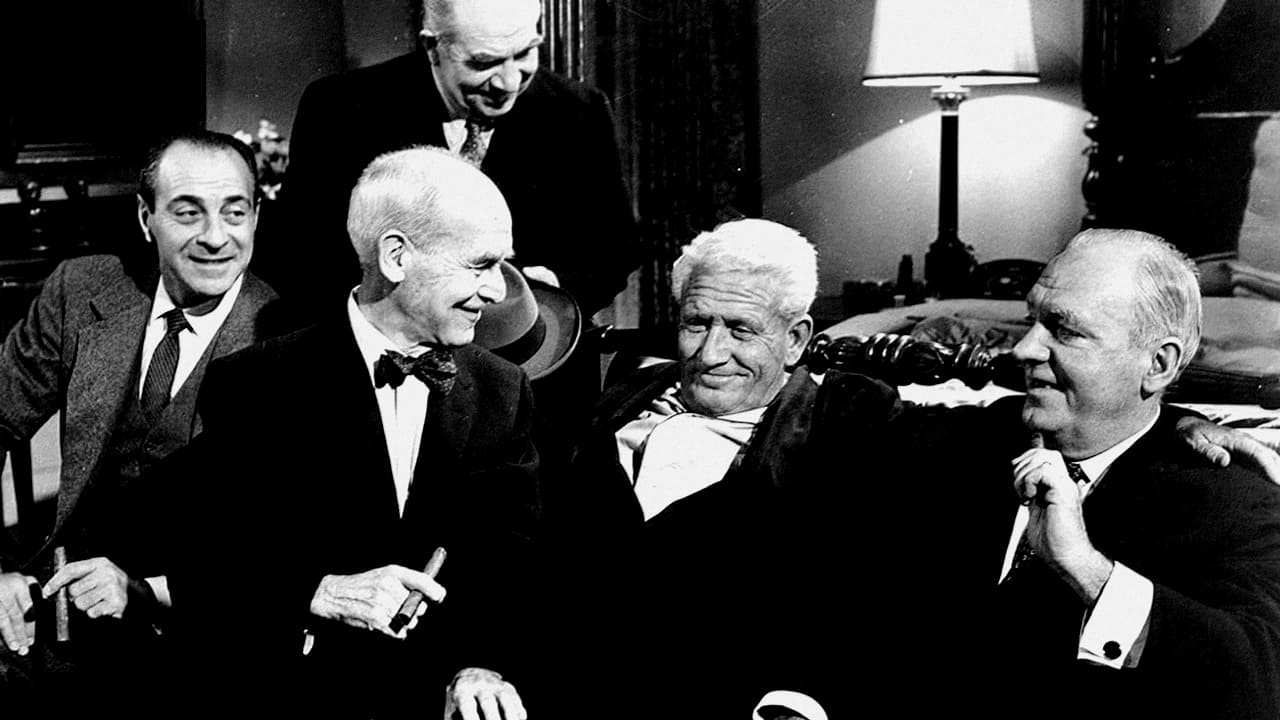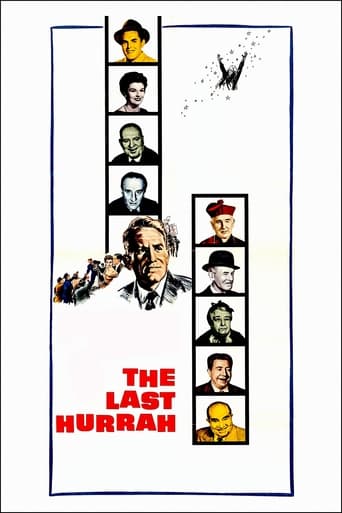

Horrible, fascist and poorly acted
... View MoreI was totally surprised at how great this film.You could feel your paranoia rise as the film went on and as you gradually learned the details of the real situation.
... View MoreBlistering performances.
... View MoreThe movie really just wants to entertain people.
... View MoreWhen I saw "political boss" described of Tracy's character in THE LAST HURRAH, I really wasn't sure where director John Ford was going with this. The two words together had me literally leaving it as my own "last hurrah" of the numerous films I've recorded and watched during Spencer Tracy's turn as October 2012's TCM Star of the Month. My queue is quite full, but proportionately I've seen few duds this last month, so I gave it a shot vs. deleting it. I'm so glad I went with my faith in Tracy's choice as an actor! He rarely went wrong. My awe of him has increased tenfold in the last 5 weeks. He was a rare great, and this rare film didn't disappoint.Also, this underrated gem is one of those movies that benefits greatly from the still intact Hays Code in the late 1950's. That opinion is due to the subtle mysteries and implied allegations mixed in with the tense relationships and amusing political tactics that keep us intrigued and entertained throughout. Too much information from either side would leave us with a completely different film as often happens in modern day films. I loved the winding way the story unfolded and left me guessing as to how it could possibly play out.As it turns out, Ford, in his unique Ford way, knew exactly what he was doing. He made a film about intriguing characters...plain and simple. This is no soap opera and there were no big Indian battles set in this quaint 1950's New England Town. However, this film had all of the entertaining qualities of Ford's character driven westerns with all of the complexities that arise off the battlefield, too. It literally was one "last hurrah" as some of the fine supporting cast retired or died within a few years. What a great way to go out on a fine film led by Spencer Tracy and directed by John Ford! I'm glad these two greats matched up, along with the stellar character actor cast, to make what was one of Tracy's greatest films of his last decade and of his career. Many think those films were made with Stanley Kramer, but I actually prefer this one to those last major statement films which Tracy made with Stanley Kramer. There's nothing like infusing interesting characters with high drama and light comedy. Not to diminish the importance of the Kramer films. It's just what I prefer as a viewer. Make time to see this film if you have a fondness for any of the cast and crew or want to see a great political drama. It will be 2 hours you'll be glad you invested.
... View MoreI'd been looking forward to this for a long time. I'm a fan of John Ford and he's given me some of my favorite films.I'll have to confess that "The Last Hurrah" disappointed me in many ways. The acting, particularly Spenser Tracy's was wonderful throughout. Ford's stable of stalwarts made the film glisten with their bit roles and backup. It was Tracy's film, though, and he's a virtuoso whichever way you view it.It's very much a black and white film - and I'm not referring to the color. There are the could guys and then the bad guys, with absolutely no subtlety at all. The good guys were the Irish who made it up the ladder through honest (?) hard work while the bad guys had English accents and inherited their wealth. Just think Basil Rathbone or John Carradine and you get the picture. The rival candidate to Tracy is an undisguised idiot with a hilarious but ridiculous "interview" on television including a barking dog and a wife who can't read. These are very, very broad lines.I can't help thinking about Frank Capra's descriptions of the other side, the "baddies" in such films as "Mr. Deeds" or "It's a Wonderful Life" There is absolutely no subtlety whatsoever. These people were educated and reared in wealthy families and should be punished. This is a very rural and dangerous flaw in the American personality that found its way in this film. But this time, they have English ACCENTS. John Ford has never been at ease with the English people in general. Sometimes, it borders on intense dislike or even hatred, and it's everywhere to be seen in this film. The protracted death-bed scene was so over-done and over-long it was embarrassing to watch. Just a-tuggin' at the old heartstrings. Cardiac arrest might be a more appropriate term. Ford didn't know when to stop. It's as plain and simple as that.Curtis Stotlar
... View MoreThis is a Classic John Ford Film dealing with old time politics in a small town, but hinting to be Boston, Mass. Spencer Tracy,(Major Frank Skeffington),"Guess Who's Coming to Dinner", plays the role of mayor who has been around for many elections and this is his final try at winning over his town. However, there are many changes starting to appear in the town and people are beginning to demand more improvements to their community. John Carradine,(Amos Force),"Prison Ship", runs the local paper in town and is not the best of friends with Frank Skeffington, however he hired Jeffrey Hunter as a reporter (Adam Caulfield),"A Kiss Before Dying",'56, who is a nephew to the mayor. It seems everybody smokes up a storm and in one scene the room is filled with smoke floating all over the place. (Glad those days are long gone) The film has many classic actors, Donald Crisp, Basil Rathbone and many more actors who make this film a very entertaining film; there is plenty of dry humor and drama, but entirely too draw out. I even noticed that Spencer Tracy used a great deal of cue cards, more than in any other film he appeared in. picture.
... View MoreI believe that I have watched "The Last Hurrah" six or eight times. It is not history. It is John Ford. Well, ... there's a bit of political, social and cultural history in this film and in the novel by Edwin O'Connor. It is a commentary, from Ford's point of view and with the customary Ford schmaltz, on big city politics in the first half of the 20th Century. Although the film never mentions the locale, it is Boston. The novelist, O'Connor, a New Englander from Rhode Island, admitted that the Frank Skeffington character was based roughly on James Michael Curley, who served as mayor of Boston four different times and as governor or Massachusetts and as a Congressman from Massachusetts. Curley wrote his autobiography in 1957, a year after O'Connor published his novel. Ford uses many of the stock company actors which he regularly used in the 1950s and '60s. But Spencer Tracy is splendid as Skeffington. When I later read the novel, I thought of Tracy as Skeffington and I constantly heard the harp music theme used in the film in my mind. "Ditto, Ditto, Ditto. How do you thank a man for a million laughs?"
... View More